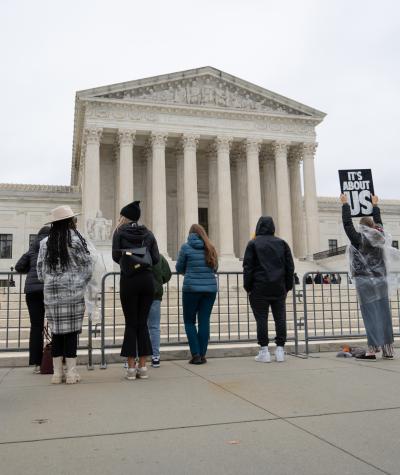The United States Supreme Court depends uniquely on maintaining its perceived legitimacy among the American people as an institution acting based on law, not political preferences. But as the Court embarks on another term in October, its perceived legitimacy has taken a major hit.
One cause of this loss of respect is widespread disagreement with key decisions reached last term – particularly overruling Roe v. Wade. Defenders of the Court might respond that a decision based on Justices’ sincere convictions about the Constitution does not become illegitimate because it is unpopular or a jarring change from prior law. Without weighing in here on whether that defense of Dobbs holds water, that is much harder to argue in another area – cases about democracy-- where it is difficult to credit any claim that the Roberts Court has been guided by any consistently applied theory of how to read the Constitution.
Over the past 15 years, in cases involving the rules governing American democracy, the Court has made a series of anti-democratic decisions that aren’t explainable as the result of a consistently applied constitutional philosophy. To the contrary, as documented in a recent Campaign Legal Center publication, the Court has given every appearance that it is deciding these cases based on their political impact.
It has veered from activism to passivity and back again. It has sometimes been highly deferential to factual conclusions and policy judgments of lawmakers, while in other contexts giving those conclusions and judgments no deference. Consequently, an objective observer is left groping for an explanation of these variations and ends up observing that the conservative wing of the Roberts Court is consistent only in rulings likely to benefit one side in America’s political battles.
On one hand, a highly deferential Court has refused to do anything when state legislators pass egregious partisan gerrymanders. The reason? The Justices say it is too hard to establish standards for judging gerrymanders, despite lower courts having done just that. This Court also willingly acquiesces when they are told that the “problem” of in-person voter fraud justifies state laws that disparately burden voting by people of color, even though there is no evidence that this problem exists.
By contrast, the Court’s conservative supermajority shows no deference when told by Congress and the states of the compelling need to protect against corruption and undue influence from special interests by applying limits to how money is spent in elections. Since Citizens United in 2010, it has consistently substituted its own judgments about whether money in politics is a problem that justifies appropriate regulation. These judgments led to an explosion of secret political spending, making it harder for voters to determine who's attempting to influence their vote.
The Roberts Court has shown similar disrespect for congressional judgments when it comes to the Voting Rights Act (VRA). Section 5 of the VRA, the all-important “preclearance” provision that dramatically transformed the voting rights of African Americans in the South after it was passed in 1965, was renewed in 2006 by a nearly unanimous Congress. This renewal was based on voluminous evidence demonstrating the continued need for close supervision of electoral laws in the “covered jurisdictions.” But far from deferring to that well-documented legislative finding, the Court in 2013’s Shelby County case conjured up a new constitutional doctrine, the equal sovereignty principle, as a means to render Section 5 inoperative.
That left Section 2 of the VRA, which authorizes courts to block voting laws and practices that result in disparate burdens for voters of color. But in 2021’s Brnovich v. DNC, the Court announced a series of criteria not found in the statute that make it hard if not impossible to use Section 2 to win relief against laws that burden the rights of minority voters. And in Merrill v. Milligan, a case coming from Alabama this term, the Court seems poised to find some way to rule that Section 2 can no longer be used to create legislative districts in which voters of color can elect candidates of their choice, even in states like Alabama that continue to exhibit high levels of racial polarization in voting.
As democracy advocates, we've long hesitated to criticize the Court directly. But as this pattern of anti-democratic and seemingly politically motivated decision-making became harder to ignore, the need to speak out became more apparent. The Court as an institution must stay true to the mission of protecting American democracy. We hope it will recommit itself to that important job.


